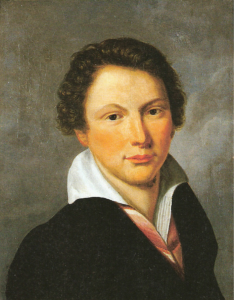Faith in spring
(Poet's title: Frühlingsglaube)
Set by Schubert:
D 686
[September 1820]
Die linden Lüfte sind erwacht,
Sie säuseln und weben Tag und Nacht,
Sie schaffen an allen Enden.
O frischer Duft, o neuer Klang,
Nun armes Herze, sei nicht bang,
Nun muss sich alles, alles wenden.
Die Welt wird schöner mit jedem Tag,
Man weiß nicht, was noch werden mag,
Das Blühen will nicht enden.
Es blüht das fernste, tiefste Tal,
Nun armes Herz, vergiss der Qual,
Nun muss sich alles, alles wenden.
The soothing breezes have woken up,
They are rustling and weaving day and night,
They are creating things everywhere.
Oh fresh fragrance, oh new sound!
Now poor heart, do not be anxious!
Now everything, everything has to change.
The world is going to become more beautiful every day,
Nobody knows what might still happen,
The blossoming does not want to end.
The most distant, deepest valley is coming into blossom.
Now poor heart, forget your distress!
Now everything, everything has to change.
All translations into English that appear on this website, unless otherwise stated, are by Malcolm Wren. You are free to use them on condition that you acknowledge Malcolm Wren as the translator and schubertsong.uk as the source. Unless otherwise stated, the comments and essays that appear after the texts and translations are by Malcolm Wren and are © Copyright.
☙
Themes and images in this text:
Flowers Hearts High, low and deep Near and far Smells Spring (season) Valleys Waking up Weaving Wind
Faith? Surely for a poem about spring, actually written on the day of the spring equinox (March 21st), what we should expect would be certainty. The world has turned, the days are now longer, the soothing breezes have already woken up. The scents and sounds of spring are apparent. Why then does the poet write about ‘faith’ in spring rather than ‘knowledge’ that it is here?
To answer this question we have to recognise that the text is addressed to an anxious heart, to someone who is going to find it difficult to believe that any change that is taking place is guaranteed to last and will offer a genuine improvement. Whatever spring has brought so far is only a promise of change, not genuine change itself: now everything ‘has to’ change, but it has not yet done so. The text is not a factual description of what is happening; it is an act of persuasion, trying to reassure someone in distress. It is all the more powerfully persuasive since the person who has to be won round is the person doing the persuading!
We have to conclude that this speaker cum listener, the owner of the poor, distressed heart, is reluctant to take comfort from the progress of spring. Although flowers have started to blossom, even in the most distant and the deepest, darkest valleys, there seems to be somewhere more remote, some deeper cleft, where the surge of new life has not yet reached, where it might never reach. For both the writer and his readers that place is our own inner self, a place where it feels as if change will never come. Can we really take what is happening in external nature as a sign or a promise of a possible inner transformation? Can we have ‘faith’ in such a promise?
Or perhaps the heart that is suffering, that is still experiencing winter, is not just that of an individual. Perhaps the poet is writing about a larger group of people, a nation, with a single, anxious heart? The text was written in March 1812, at the high point of Napoleon’s power in central Europe. Although the Emperor was losing ground in Spain he was still in a position to recruit Prussians and Rhinelanders to help with his invasion of Russia. Uhland, in Schwabia, (who later went on to play an active part in liberal, anti-authoritarian politics) could have been offering reassurance to his compatriots that the distant blossoming (in Spain) was the beginning of a spring that would bring about a total change.
☙
Original Spelling Frühlingsglaube Die linden Lüfte sind erwacht, Sie säuseln und weben Tag und Nacht, Sie schaffen an allen Enden. O frischer Duft, o neuer Klang! Nun armes Herze, sey nicht bang! Nun muß sich Alles, Alles wenden. Die Welt wird schöner mit jedem Tag, Man weiß nicht, was noch werden mag, Das Blühen will nicht enden. Es blüht das fernste, tiefste Thal. Nun armes Herz, vergiß der Qual! Nun muß sich Alles, Alles wenden.
Confirmed by Peter Rastl with Deutscher Dichterwald. von Justinus Kerner, Friedrich Baron de la Motte Fouqué, Ludwig Uhland und Andern. Tübingen in der J. F. Heerbrandt’schen Buchhandlung. 1813, page 5; and with Gedichte von Ludwig Uhland. Stuttgart und Tübingen in der J. G. Cotta’schen Buchhandlung. 1815, page 54.
To see an early edition of the text, go to page 54 [60 von 480] here: http://digital.onb.ac.at/OnbViewer/viewer.faces?doc=ABO_%2BZ168294808


